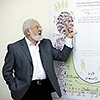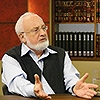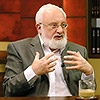Audio Version Of The Blog – 8/13/23
Listen to an Audio Version of the Blog
Download:MP3 Audio

Listen to an Audio Version of the Blog
Download:MP3 Audio
 Question: In the “Preface to the Wisdom of Kabbalah” Baal HaSulam describes the four stages of the development of the desire. We understand that desire is the basis of man. How did the Creator create it in four stages?
Question: In the “Preface to the Wisdom of Kabbalah” Baal HaSulam describes the four stages of the development of the desire. We understand that desire is the basis of man. How did the Creator create it in four stages?
Answer: The fact is that initially, there was a source of light. Light is defined as the force of pleasure from everything that the Creator wants to fill the world with.
The force of light generates desire because the main and only quality of the light is the desire to fill, saturate, and delight the future creation. The Creator’s desire is to bestow, to love, to fill. In general, this is what comes from the Creator, and this determines His relation to creation.
The Creator’s intention to create and fill the creation is called “the first stage of creation”—the Creator’s attitude to the future creation. It is considered to be the first light that comes from the Creator.
Then this degree begins to create a desire within itself, the desire to receive from the Creator. All that comes from Him is the desire to receive. This desire to receive, which almost simultaneously comes from the Creator and is filled with light, is called the first stage of the development of the world, the universe.
Then the desire develops further under the influence of the light that fills it and begins to express itself in a certain way, meaning, to perceive from the light not only the filling, but also the qualities of the light to fill, animate, and love, all that is positive that the Creator or the upper light carries. Thus, from the first stage arises the second.
The second stage, first reacts to the fact that the Creator created it in the desire to receive and enjoy. But the light that works in it transmits its qualities to it—the qualities of bestowal, love, and fulfillment.
Therefore, the second degree, which is formed from the first, is absolutely opposite to it. It does not want to receive, but wants to give just like the Creator.
If the first degree, that is, the desire to receive, and the light that fills it are called Hochma, then the second degree, which is absolutely opposite to it, is called Bina and does not want to receive the light. It would like to give in the same way, but what can it give? Therefore, the second degree, in principle, remains empty except for the fact that it is filled with a sense of existence emanating from the Creator, in the sense that by wanting to bestow, it is still somewhat similar to the Creator.
Then comes the development of the first and second stages. Closing in on each other, they build the third stage, which is called Tifferet or Zeir Anpin.
[315561]
From KabTV’s “Preface to the Wisdom of Kabbalah” 7/16/23
Related Material:
Phases of Development of the Will to Receive
The Structure Of The Universe, Part 3
The Structure Of The Universe, Part 2
 Question: When you say something, do you generally say it from the point of view of truth?
Question: When you say something, do you generally say it from the point of view of truth?
Answer: Relatively concerning the person who receives it and no more than that. There is nothing absolute in our world nor in attainment of the upper world. But there it is clear.
Question: Let’s say you explain something to the students, and with regard to one this is the truth, but with regard to the other two, in their perception, this is nonsense. Where is the common ground for these three people?
Answer: The common ground is that each of them understands that what the other feels is true with regard to him, but maybe not with regard to me.
Comment: There are people who take it as a truth that they can cure all diseases by vegetarianism, others by raw food, and others by yoga. And this does not change at all throughout life.
My Response: It does not change the same way it does in animals. The more often a person’s opinions change, the better because it means that he himself changes, which means that he is human. The one who does not change is an animal, a petrified frozen individual.
When he has many opinions and is constantly in doubt, does not know with what to agree and with what not to agree, and is in some special state, then he is human.
Truth is born from doubts and then is refuted in doubts, and the next one is born. This is how we grow: day and night and day and night, in our sensations, conclusions, analyses, synthesis, and decisions.
Therefore, one who does not make mistakes is not human.
It is humans who make mistakes. Animals do not make mistakes. If an animal makes a mistake, then it is sick. In a person, this is his normal state because he is constantly developing. His evolution takes place throughout his entire life, whereas for animals this is not the case.
[315679]
From KabTV’s “I Got a Call. Where Is the Truth?” 8/27/11
Related Material:
Where Is The Truth?
The Truth Above All
How To See The Truth?
 Comment: Question from Ghenghis: “Thousands of years of wars, revolutions, famine, and poverty, right up to the troubles of today’s reality. If a man needs a piece of bread, what is the role of books in his life? Why are they needed?”
Comment: Question from Ghenghis: “Thousands of years of wars, revolutions, famine, and poverty, right up to the troubles of today’s reality. If a man needs a piece of bread, what is the role of books in his life? Why are they needed?”
My Response: It is written that, “If there is no flour, there is no Torah; and “if there is no Torah, there is no flour.” That is all. So it is interconnected. Torah means a blessing from above, from the upper force of nature. Without this there will be no bread, and vice versa, without bread you cannot achieve real blessing.
Question: Does “If there is no flour, there is no Torah” mean “if there are no necessities”?
Answer: Of course.
Question: But obviously Ghenghis is not asking about the Torah, but about books in general. Why do I need them if I am hungry? Why do I need them if there are such troubles and suffering around?
Answer: You really do not. You only need to know one principle: how to approach the Creator and follow His instructions, which brings about balance in the world, in the universe. That is it.
In the course of my life, I need only one true guide: how to use this life to achieve its true single upper goal, which is to reveal and adhere to the Creator.
We must acquire the properties of the Creator, the properties of bestowal and love, and thus unite with Him. This is the purpose of life.
Question: There are certain books for this, but do I not need all the other books, all these novels? Do I need any of them at all?
Answer: No, of course not. Because they are written by humans and because they are imperfect and only twist a person. What do we get from them as a result? They just mess with people’s heads people!
[315660]
From KabTV’s “News with Dr. Michael Laitman” 7/17/23
Related Material:
Demanding Bread And Education
Is Food the Meaning of Life?
The Laws Of Nature Contain Everything That Is Good
 Question: We want to bestow, but how can we avoid egoistic intentions in the group since they prevent us from revealing the glory of the Creator?
Question: We want to bestow, but how can we avoid egoistic intentions in the group since they prevent us from revealing the glory of the Creator?
Answer: Just continue. Forcibly continue to move toward the connection between each other and demand that the Creator reveals Himself between you.
Question: How does a person feel the governance of the Creator in oneself? Where is the person in this action?
Answer: He feels it as a meeting with the most needed, kindest, desired friend. And you will feel that now the Creator is controlling you.
Question: Did the Creator create the evil inclination so that a person would manage it? How does this affect all worlds?
Answer: To the extent that you evoke the manifestation of the Creator, you fill all the worlds with it.
[316217]
From the Daily Kabbalah Lesson 7/30/23, “Revealing the Glory of His Kingship”
Related Material:
Questions About Spiritual Work—5
Questions about Spiritual Work—4
Questions about Spiritual Work—3
 It is as we say (In the Eighteen in the Supplementary Prayer of Rosh Hashanah), “Our Father, our King, reveal the glory of Your kingdom upon us,” namely that the kingdom of heaven will not be to us as dust, but rather glorified.
It is as we say (In the Eighteen in the Supplementary Prayer of Rosh Hashanah), “Our Father, our King, reveal the glory of Your kingdom upon us,” namely that the kingdom of heaven will not be to us as dust, but rather glorified.
It follows that what this kind of people demands of the Creator is that He will reveal to them the glory of His kingship, and have nothing with the Creator since they do not require any reward from the Creator. Rather, all they want is to serve the King and please Him. They ask that the Creator will show them the glory of the kingdom of heaven (Rabash, Article No. 34 (1985), “And I Pleaded with the Lord”).
Question: If people want only to serve the Creator, why do they demand that He reveal the glory of His kingdom to them?
Answer: It is exactly so that they could serve Him. If the Creator is concealed, we will not be able either come closer to Him or serve Him in any way. He will look small or non-existant in our eyes.
Therefore, we need Him to reveal Himself at least a little. To this extent, we will be able to serve Him.
This is why we say, “Reveal the glory of Your kingdom upon us so that we can honor You and serve You.”
Question: How can He reveal His glory?
Answer: It is His business how to do it. We ask because we cannot do it without it. If He does not reveal Himself, we will not have the strength either to bestow to Him or to receive from Him.
Receiving from Him is even more difficult than bestowing because when I receive, I use my egoistic desires. I have to correct them and use them only for bestowal. Then my reception will be for the sake of bestowal, and this is very hard work. We are always tempted to fall into receiving for ourselves.
Question: If we do not want to receive from the Creator and make the restriction on reception, then what are we holding on to? What is the criterion of the connection with Him?
Answer: We hold on to the fact that we want to give Him contentment. At the same time, we enjoy His greatness and not the actual fulfillment from Him.
Question: What is the difference?
Answer: Our egoistic desires to receive seek to enjoy the fulfillment. But to enjoy His greatness is when we feel His greatness in all the worlds, in the whole world, and enjoy it; that is, we enjoy the fact that we belong to Him.
[316206]
From the Daily Kabbalah lesson 7/31/23, “Revealing the Glory of His Kingship”
Related Material:
Chosen To Serve The Creator And The Creatures
Kosher, Suitable To Serve The Creator
A Bridge Of Love Over An Abyss Of Egoism
 Comment: Certain circles also study Kabbalah, and they are actually trembling after they read, for example, The Book of Zohar. They sit by candlelight and believe that something is happening to them there.
Comment: Certain circles also study Kabbalah, and they are actually trembling after they read, for example, The Book of Zohar. They sit by candlelight and believe that something is happening to them there.
My Response: There are many mystics everywhere.
Question: What defines mysticism in general? Why is Kabbalah not mysticism?
Answer: Kabbalah speaks about things a person must correct within himself in order to attain what is written in Kabbalistic books. Most people do not feel the need for it. But they were told that Kabbalah is very important, so they study it.
I met such people at RABASH’s. The fact is that his father, Baal HaSulam, had students who really wanted to attain the upper world. They moved toward this and really became Kabbalists and entered into the feeling of the upper world.
But they had children without any need for this. They lived by sometimes studying Kabbalah or simply reading Kabbalistic books, some of them more and some less. They had no desire for more. I met them at RABASH’s.
Look how many students come to me—thousands! And then they leave because they see: “We need to work on ourselves, do something with ourselves.”
They are trying to find some secrets and interesting “gadgets,” just not to change themselves in order to feel the world around them through this.
But it is necessary to work seriously on yourself, to change the whole setup of your egoistic perception and thinking. “Why? Better show me some kind of trick,” but there are no tricks! They confuse Kabbalah with mysticism, become disappointed, and immediately leave.
[315554]
From KabTV’s “I Got a Call. The Secret Information” 8/20/11
Related Material:
Am I A Mystic Or A Prophet?
Only Kabbalah Combines All the Right Ingredients
“Is “Kabbalah Mysticism” Just A Method Which States That The Human Mind Uses A Constant And Repetitious Pattern, When It Thinks About Any Subject?” (Quora)
 Question: Is it possible to develop a sect from Kabbalistic teaching?
Question: Is it possible to develop a sect from Kabbalistic teaching?
Answer: A sect is a certain structure of a closed organization where there is an unquestioning submission of the members of the sect to the guru and the so-called truths they blindly bow down before. It is possible that sects have their own paraphernalia, some conditional actions, mantras, physical techniques: dances, postures, etc.
It is impossible to make a sect out of real Kabbalah because the most important principle of Kabbalah is the spiritual development of a person. Therefore, entry and exit are absolutely free! This is the first thing.
Secondly, Kabbalah is based on personal comprehension. Third, there is no pressure on a person to do something or think this way and not otherwise. As far as you can, you adapt this knowledge inside you.
In addition, all Kabbalistic literature, which has existed for thousands of years, is absolutely open to everyone.
Comment: But sects also use well-known literature, for example, the Bible.
My Response: Maybe. Frankly, I do not know. Sect, not a sect, I have never been interested in this. I am interested in teaching Kabbalah and spreading it.
And what they say about us… People will always talk! Sometimes such opinions are suddenly revealed about me that I cannot even imagine how people can think like that if we are open to everyone.
Books in all languages, television, the Internet—everything is absolutely available. Please, come to a lecture. If you do not want to leave the house, there are virtual classes. What is there to stir up the mystery if we act quite openly? And yet, sometimes people have such ideas!
I attribute this to the fact that a person must work out his understanding of nature, society, and the universe. Therefore, these representations are formed in it. A person needs to pass them.
So it was at all times. Kabbalists have always been in a terrible state of exile, even from their own society. They lived as if within the framework of the Jewish religion, but they were not perceived there, not revered in any way, in no way respected. It was very hard for them!
[315547]
From KabTV’s “I Got A Call. Kabbalistic Sect” 8/27/11
Related Material:
Salvation or Correction?
Fanaticism or Attainment?
Kabbalah Is Not A Sect
 Michael Laitman, On Quora: “How can we live our lives with happiness?“
Michael Laitman, On Quora: “How can we live our lives with happiness?“
In our corporeal lives, we come into contact with various pleasures, but we remain unhappy because the moments of pleasure instantly disappear. They are temporary because the contact with a pleasure in order to receive it for self-benefit alone cannot sustain itself for longer than a moment.
At the end of all such moments is death, hopelessness and disappearance. Due to the limited nature by which we encounter pleasures, we thus have no happiness in our lives. It is our world’s inherent flaw.
Happiness comes about when we make contact with a dream, one that is eternal and perfect.
Therefore, having happiness in our lives means we need to attain eternity and perfection.
How can we attain eternity and perfection? It is by rising from this world—a level of perception where we constantly try to enjoy for self-benefit alone—into the spiritual world—a level of perception where we enjoy through a new sense of bestowal upon others and nature.
Even when we rise one degree into the spiritual world, and we find how it is still an incomplete state, we nonetheless then understand that we have made a very significant leap into a spiritual perception of reality. We then acquire much clearer direction to our lives, different ideas about the world, the universe and existence, and the understanding that we are dealing with eternity, perfection, infinite fulfillment and infinite knowledge. We then feel that whatever we want, we will be able to obtain.

Based on KabTV’s “I Got a Call. Happiness” on January 18, 2011. Written/edited by students of Kabbalist Dr. Michael Laitman.
Preparation to the Lesson
1st part of the Lesson — Writings of Rabash, “Letter 40”
2nd part of the Lesson — Writings of Baal HaSulam, “Preface to the Wisdom of Kabbalah,” Item 166
Selected Highlights